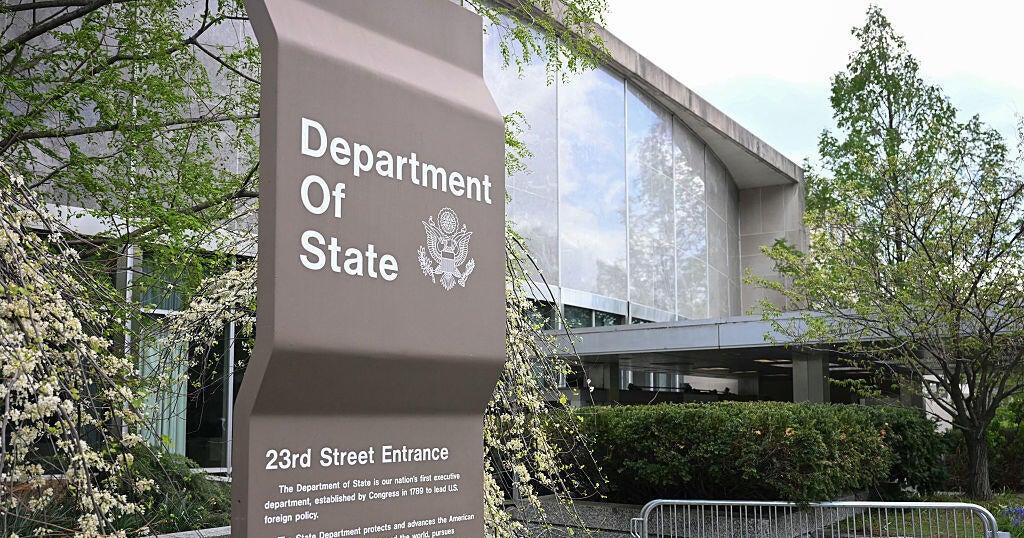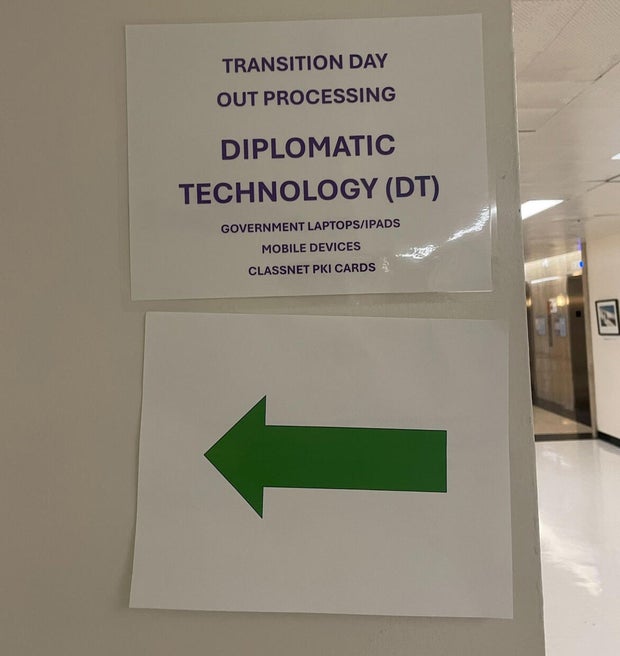
State Department enacts widespread layoffs, cutting 1,353 staff as part of reorganization
Washington — The State Department on Friday began laying off more than 1,300 staffers as it seeks to cut the size of its U.S. workforce by about 15%, part of the Trump administration’s sweeping plan to reorganize the department.
The involuntary staff reductions include 1,107 civil service and 246 foreign service employees, according to a notice sent to State Department employees Friday morning that was obtained by CBS News. The total number of staff departing as a part of the State Department’s reorganization is “nearly 3,000,” according to the department, a figure that includes those who took the “Fork in the Road” voluntary departure offer earlier this year.
The department is also closing or merging scores of U.S.-based offices and rearranging its organizational chart shortly after. The layoffs, called a reduction-in-force, or RIF, have been expected for months. Officials sent a reorganization plan to Congress in March, signaling the cuts. The Trump administration says the cuts are necessary to remove redundant offices and focus the department on its core responsibilities.
Critics argue the cuts could undermine the State Department’s work. All Democratic members of the Senate Foreign Relations Committee penned a letter to Secretary of State Marco Rubio on Friday denouncing the RIFs.
“During a time of increasingly complex and wide-spread challenges to U.S. national security, this administration should be strengthening our diplomatic corps—an irreplaceable instrument of U.S. power and leadership—not weakening it,” the senators wrote. “However, RIFs would severely undermine the Department’s ability to achieve U.S. foreign policy interests, putting our nation’s security, strength, and prosperity at risk.”
Foreign service officers who received RIF notices will be separated in 120 days, the notice sent to employees said, while civil service officers will be separated in 60 days.
The long-planned layoffs are taking place days after the Supreme Court cleared the way for the Trump administration’s sweeping plans to slash the size of the government workforce, pausing a lower court order that halted layoff plans at dozens of federal agencies.
Department staff were informed of the impending reduction-in-force plans in a Thursday afternoon message from Deputy Secretary of State Michael Rigas, who thanked departing staff “for their dedication and service to the United States.” Two sources familiar with the matter said RIF notices started going out to affected employees on a rolling basis on Friday morning. The department previously told reporters it plans to conduct the reductions-in-force over the course of a single day.
Some employees were told that due to the anticipated RIF, they would not be permitted to telework on Friday, and should report to work with all department-issued equipment including laptops, telephones, diplomatic passports, travel cards and any other property owned by the State Department. An email with these instructions told staff that badges would be collected during “out processing,” and to ensure that any personal items be collected before that time.
Signs were spotted in some State Department bathrooms Friday urging remaining staff to “resist fascism” and “remember the oath you vowed to uphold.”
Layoffs hit human rights, refugee-focused departments
Many of the reductions-in-force hit offices that were slated for elimination or cuts, including ones that focus on refugees, human rights and foreign assistance.
The cuts included nearly all civil service officers in the Bureau of Population, Refugees and Migration’s office of admissions, which handles the program that resettles refugees in the U.S., according to two sources familiar. The move came as a surprise to staffers because the office had been handling a program to resettle Afrikaners from South Africa, a White House priority.
The population bureau’s entire global programs office, which handles foreign assistance, was also let go. The office has 391 active grants, a source told CBS News. Staff were not told what will happen to those programs, but a source notes the money was already congressionally mandated. The bureau’s office of multilateral and global affairs was also eliminated.
Meanwhile, all leadership team members of the State Department’s Coordinator for Afghan Relocation Efforts (CARE) office, which has relocated nearly 200,000 Afghan allies and family members since 2021, also received reduction-in-force notices, according to the group AfghanEvac. In a press release, the organization says among those affected by the RIFs were a woman who gave birth to her first child just 12 hours before receiving the news.
One laid-off employee was Jose Mercado, who had worked at the agency for 29 years and served as deputy director of the Bureau of Democracy, Human Rights, and Labor’s office of western hemisphere affairs. He told CBS News it was a “sad day for foreign policy.”
“It’s a sad day for human rights in the world. This did not make us stronger, this made us weaker,” Mercado said. “We will come back. We will improve. This is going to be better. But right now, we’re not in the best position when it comes to foreign policy.”
Members of the Bureau of Oceans and International Environmental and Scientific Affairs faced reductions-in-force, including press officers, two sources familiar told CBS News.
And an office that handled organizing Rubio’s trip to Malaysia for the ASEAN Summit was eliminated, with its Civil Service employees receiving reduction-in-force notices — as the secretary was en route back from the summit. That department is the office of multilateral affairs in the Bureau of East Asian and Pacific Affairs, according to two sources familiar.
Sweeping State Department reorganization
After the reduction-in-force notices go out, the agency will move into a “transition period of several weeks” to phase in the new organization chart, a senior State Department official told reporters on Thursday.
The official said the changes are aimed at “streamlining this bloated bureaucracy,” cutting redundant departments, consolidating functions like human resources and finance, and shifting more focus to foreign embassies and offices assigned to handle specific regions.
For example, the official said, the State Department has multiple offices that oversee sanctions.
“Now, no one’s saying that the people who were working in any of those sanctions offices weren’t doing a good job or weren’t valuable members of the State Department family, but at the end of the day, we have to do what’s right for the mission and what’s right for the American people, and that means having one combined sanctions office,” the official said.
The department’s Political Affairs bureau — which includes the country-specific desks that handle the United States’ relations with individual nations and regions — is “largely unaffected by the reductions,” according to the official.
Another senior State Department official told reporters the department “identified offices where natural efficiencies could be found.”
“We took a very deliberate step to reorganize the State Department to be more efficient and more focused,” Rubio told reporters during a trip to Malaysia on Thursday.
The State Department formally told lawmakers in May that it intended to eliminate about 3,400 U.S.-based jobs and close or merge almost half of its domestic offices. At the time, the department said it planned to phase out some offices focused on democracy or human rights that it claimed were “prone to ideological capture,” and add new offices focused on “civil liberties” and “free market principles.”
The plan also integrates the previous functions of the U.S. Agency for International Development into the State Department, after the Trump administration moved to shutter the foreign aid agency. That move has drawn stiff criticism, with Democrats arguing the agency was unlawfully shut down without permission from Congress and humanitarian groups warning the shutdown could endanger public health.
Democrats — and department staff — push back
The broader cuts to the State Department have drawn pushback from Democratic lawmakers, who argue the moves could undermine American diplomatic efforts.
“The notion that it’s a plan dignifies it. It’s just a willy-nilly effort to just sack a whole lot of people,” Sen. Tim Kaine, a Virginia Democrat, told reporters Friday.
Many department staff have also expressed alarm at the changes. The American Foreign Service Association, which represents foreign service officers in the U.S. and abroad, said Friday the layoffs are “untethered from merit or mission” and could signal to other countries that “the United States is pulling back from the world stage.”
“They target diplomats not for how they’ve served or the skills they have, but for where they happen to be assigned. That is not reform,” the association said in a statement Friday.
For foreign service officers, who typically rotate between assignments every few years, the reductions-in-force are based on whether they worked in an office impacted by the reorganization on May 29, one of the two senior State Department officials told reporters Thursday.
A current State Department employee told CBS News there are people who were in these positions six weeks ago but have since moved on to new assignments. “So why would you punish them for previously having held a job that they’re no longer in?” they said. “It makes absolutely no sense.”
The second senior State Department official told reporters, “we’ve tried to do this in an anonymized, functional way.”
“Some of these are positions that are being eliminated, not people,” Rubio said Thursday.
The first senior department official also said, “We’re going to work to handle this in a manner that preserves, to the maximum extent possible, the dignity of federal employees.”
contributed to this report.
